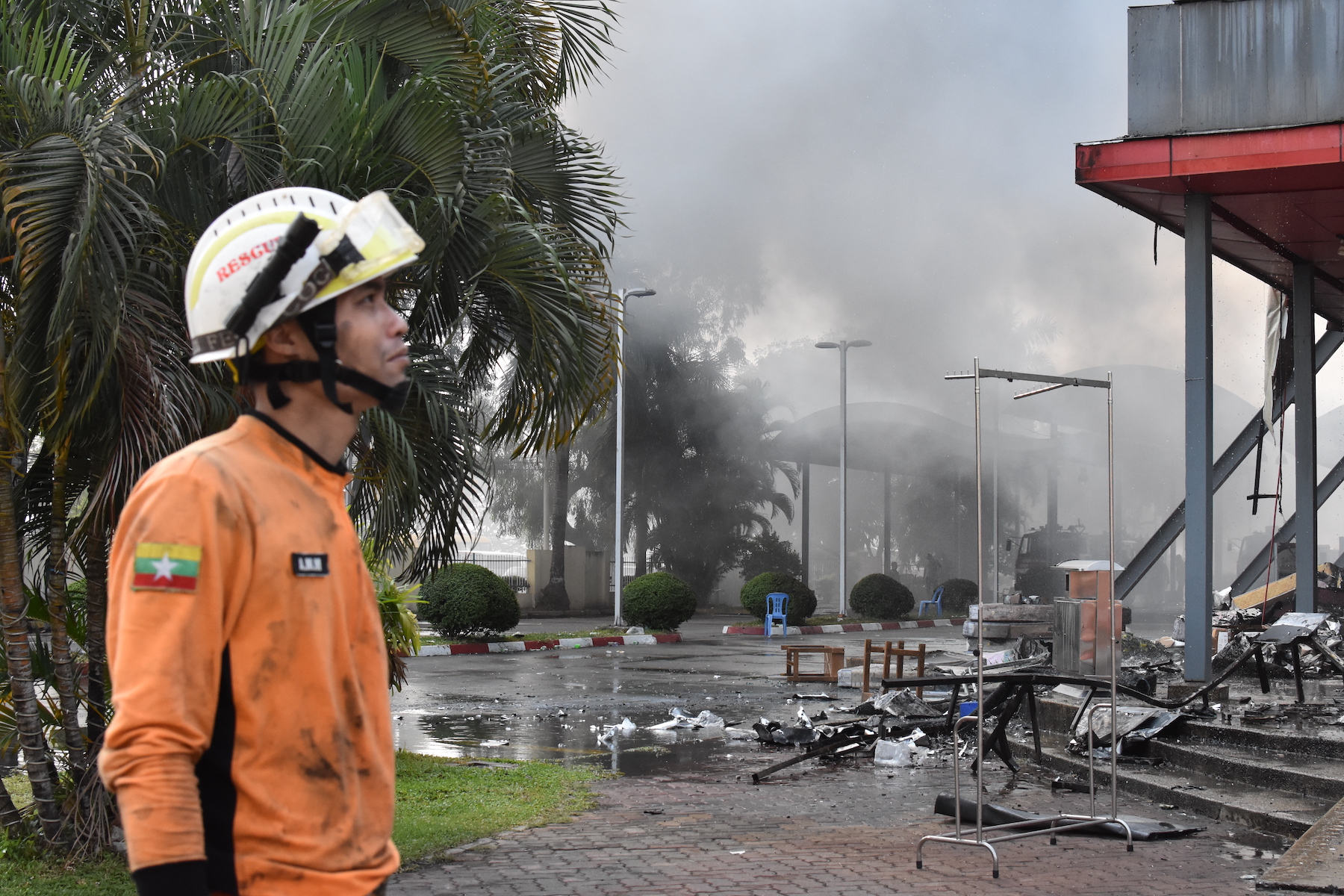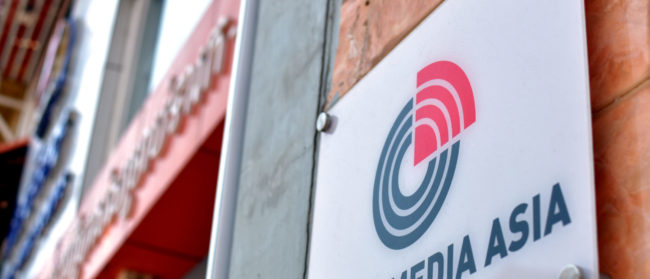This story was produced in partnership with the Pulitzer Center. Here is the story of how I came to be on a military-guided tour in Myanmar and what took place over the course of this surreal, controversial and heavily-choreographed week. This is a long-form version of an article co-published with the Washington Post.
“Why don’t you come see for yourself?” Ari Ben-Menashe, the foreign lobbyist hired by Myanmar’s new military junta regime, asked bluntly.
It was with this one question that I became involved in the now-infamous military PR tour in Myanmar.
Over the course of the week, I, along with CNN, was paraded around Yangon and Naypyidaw, escorted at all times by military staffers. In a highly-choreographed effort, the tour was an effort by the regime to remake its global image amidst rising international sanctions and condemnation for their crackdowns on anti-coup protesters.
Military lobbyist Ben-Menashe was the ringleader.
During my first conversation with him for a separate article I was writing, he had been making unsubstantiated claims belittling the protest movement that had erupted in opposition to the country’s February 1 coup. He wanted me to see firsthand that he was right and the international media was wrong. If anything, the trip further confirmed just how misguided he was.
A few days later, after sending over a copy of my passport, I got a phone call.
“Hi Allegra, it’s Ari Ben-Menashe. I just wanted to let you know that we have submitted your request and it is now with the highest levels of people. I mean the highest of levels,” seemingly referencing authorities within Myanmar’s junta regime.
While still suspicious, I was beginning to think that this Canadian-Israeli PR man, who had worked with some of the world’s most brutal figures, including Zimbabwe strongman Robert Mugabe and Libyan general Khalifa Haftar, was in fact going to keep his word.
Ben-Menashe, or his assistant, would call me regularly – often once a day. Many times during these phone calls he would yell and reprimand me for asking simple questions about security provisions and itineraries.
“Why don’t you listen when I speak?” he growled at me during one particularly angered phone call. “Are you a child? Do you need permission from your parents?”
And yet, despite this, after a few weeks, Ben-Menashe’s assistant called again to say my visa was ready to be picked up at the Myanmar embassy in Phnom Penh. By evening on March 25, I had a single-entry business visa for Myanmar securely stamped into my passport.
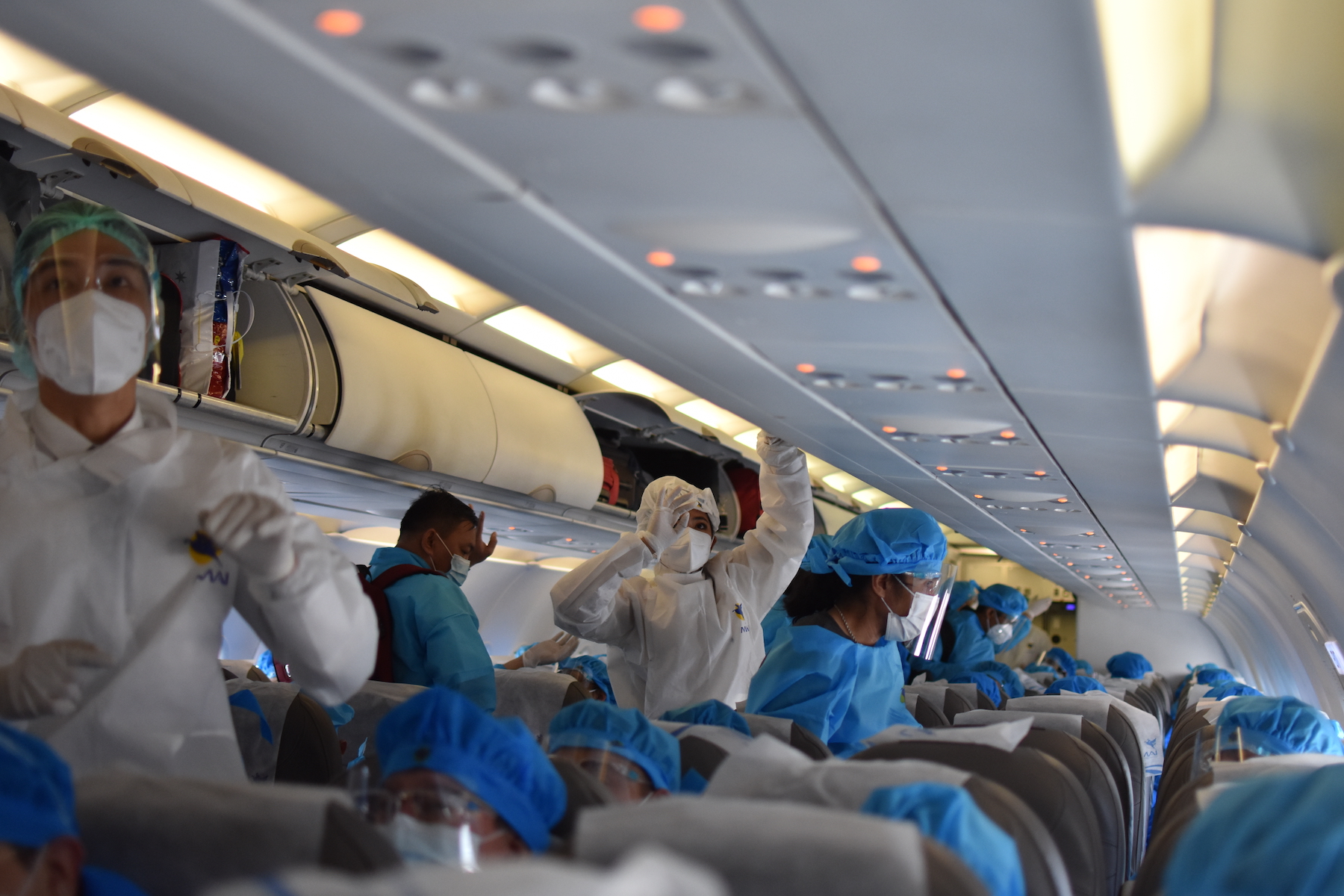
I flew into Yangon on March 30 on a relief flight from South Korea. I had been expecting an empty aircraft with a handful of aid workers. Instead the plane was nearly full, occupied by Myanmar passengers – some repatriating to reunite with family, others to stand in solidarity with the protest movement.
From the moment we landed in Yangon, we were barred from moving around freely, met at the airport by three of what would be dozens of handlers. I corresponded digitally with high caution, using only a burner phone connected to a VPN, concerned that all communications were closely monitored. It didn’t matter in the end: After our first day in Yangon WiFi across the city was turned off, likely in an effort to limit what we could share online.
We stayed at a military guest house, gated and armed by soldiers bearing rifles. At least two uniformed men were on guard at all times, sitting outside their watch box next to the gate. That changed only on the final day, when they were replaced by men in civilian clothing.
Soldiers are not supposed to speak to the media. All Western media is trying to convert us and change our views. The only good media is state-run
On our first day, following an early breakfast, we were ushered into an idling mini van parked outside. Our liaison, along with several other staff, mainly Ministry of Defense (MoD) personnel and translators, piled in with us. We were then escorted around Yangon by a six-vehicle military convoy, each with 10-15 armed and uniformed soldiers.
Many of these soldiers operate on the frontlines in carrying out the military’s violent tactics, but are rarely heard from. Their insulation from outside news in particular, seemed to suggest a herd mentality where little agency is afforded.
“Soldiers are not supposed to speak to the media. All Western media is trying to convert us and change our views. The only good media is state-run,” said one MoD handler when I asked to interview members of our convoy. While I was eventually permitted to speak with a few of the soldiers, the conversations were heavily-censored.
For the duration of our trip, these assigned escorts and minders monitored our every move, always with cameras and phones raised to record us. They even tried following us into bathrooms at times. Our military liaison told me this was for “our own safety,” to protect us against the “violators”, the term used by the military to refer to the anti-coup protesters. It seemed useless to tell him that for most people in Myanmar, the real threat came from those in fatigues.
It was also clear from the number of cameras that the military wanted to claim transparency by showcasing the presence of international media. However, when we tried to photograph any military handler, they would turn their heads. Attachment to this trip was not something that MoD staffers seemed to want recorded. After a photo of one of our minders was posted on Facebook, he was pulled from our convoy.
If the trip had been a secret before we arrived, the caravan of soldiers immediately aroused suspicion among those we drove past. Pedestrians raised their camera phones to take pictures, and whispered rumours of a foreign press tour rapidly turned into confirmed gossip.
I managed to remain anonymous, but news of a CNN press tour quickly made international headlines, and controversy soon followed.
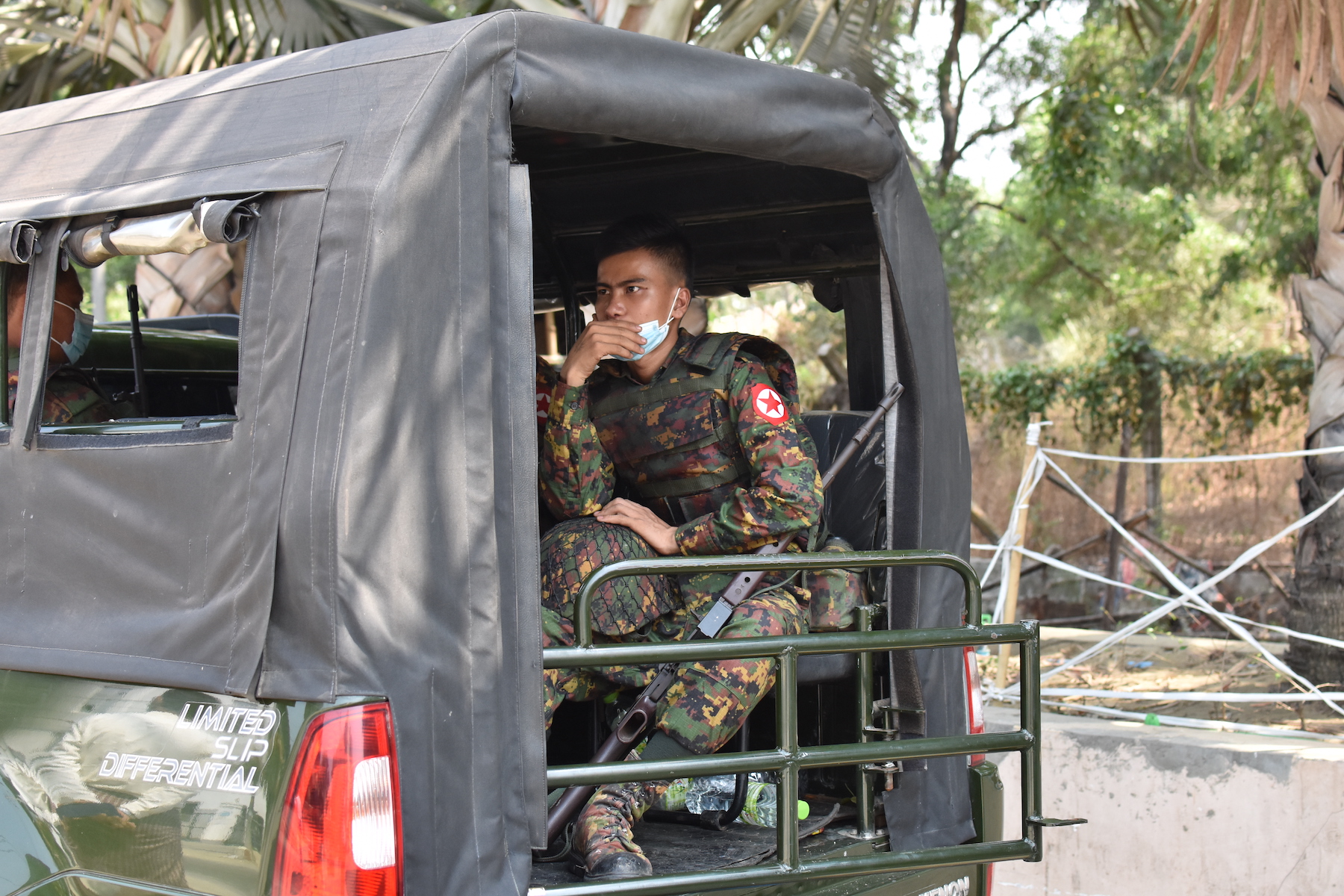
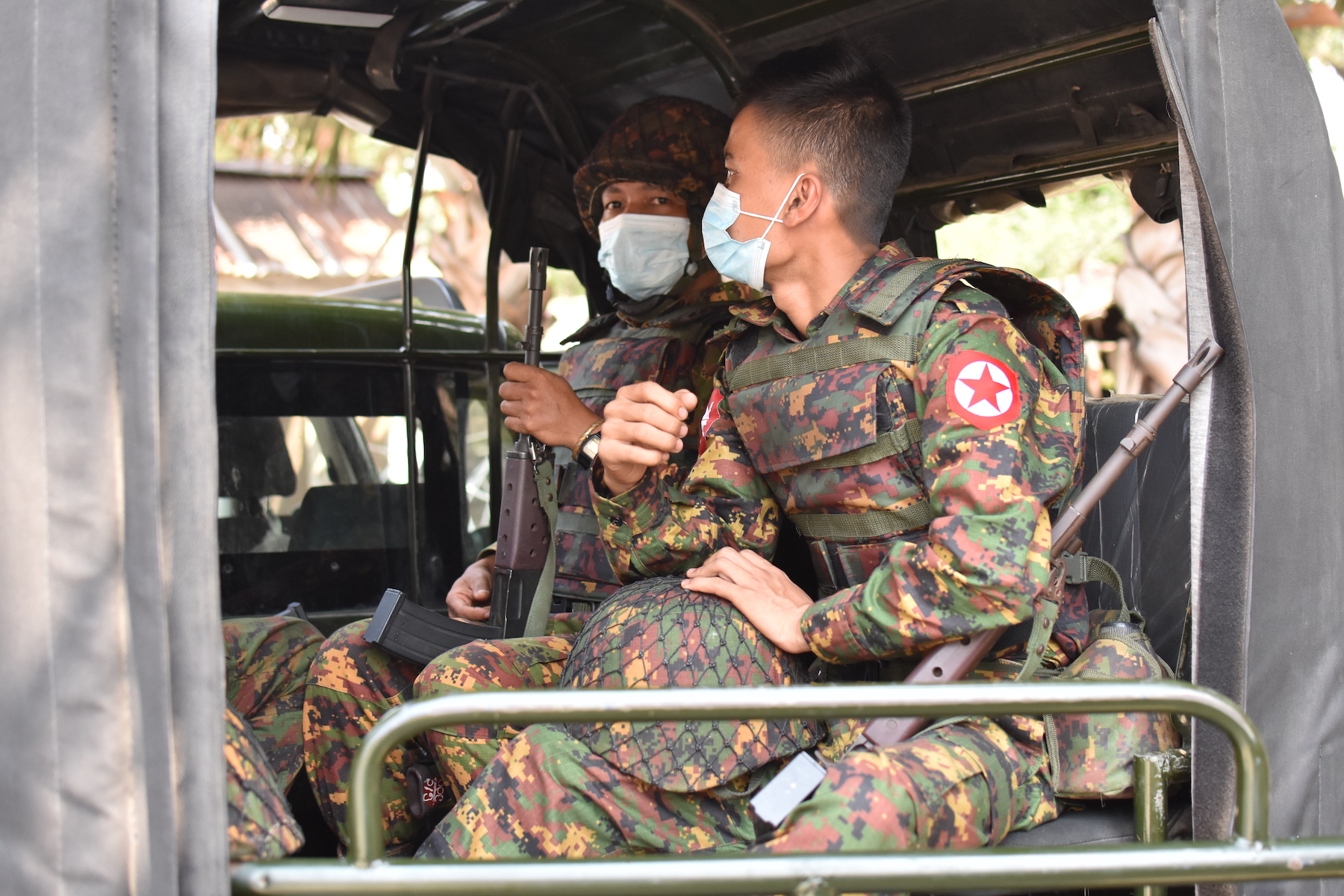
During the first two days of the tour we were taken to locations carefully selected to showcase instances of protestor (as opposed to military) violence. We visited three township administration offices in the northern parts of Yangon, as well as several factories that had reportedly been burnt down by members of the protest movement, including Gadamar Wholesale Shopping Center – still smoking when we arrived.
At each stop, we were met by individuals with seemingly rehearsed tales of being attacked or defamed by protesters since the coup. The stories we were fed were often hard to believe, with changing timelines and little credible evidence. In several instances, the language employed, especially the use of the phrase “human rights violations”, seemed specifically crafted to appeal to our sensibilities as foreign reporters.
However, despite the ambiguity and performative undertones, these conversations made the military’s agenda and platform very clear. To the generals in Naypyidaw, their actions were warranted by one simple calculation: four deaths, purportedly the result of the anti-coup demonstrations in Yangon, justified the over 600 murders of protestors by security forces.
Major General Zaw Min Tun avoided the question when I asked about this during my interview with him later in Naypyidaw, probing how he could justify this staggering disproportionality.
Instead, he scapegoated Western media as the culprits, echoing what the handler had told me earlier in the trip.
“Media outlets in Myanmar have been supported by Western countries so they would never reveal the real situation in the country,” said the general. “They always try and exaggerate the real situation.”
Even when given the full stage to present their side of the story, the military’s main line of defence failed. Utterly detached from the reality on the ground, for them, proportionately and truth are irrelevant when their authority is challenged.
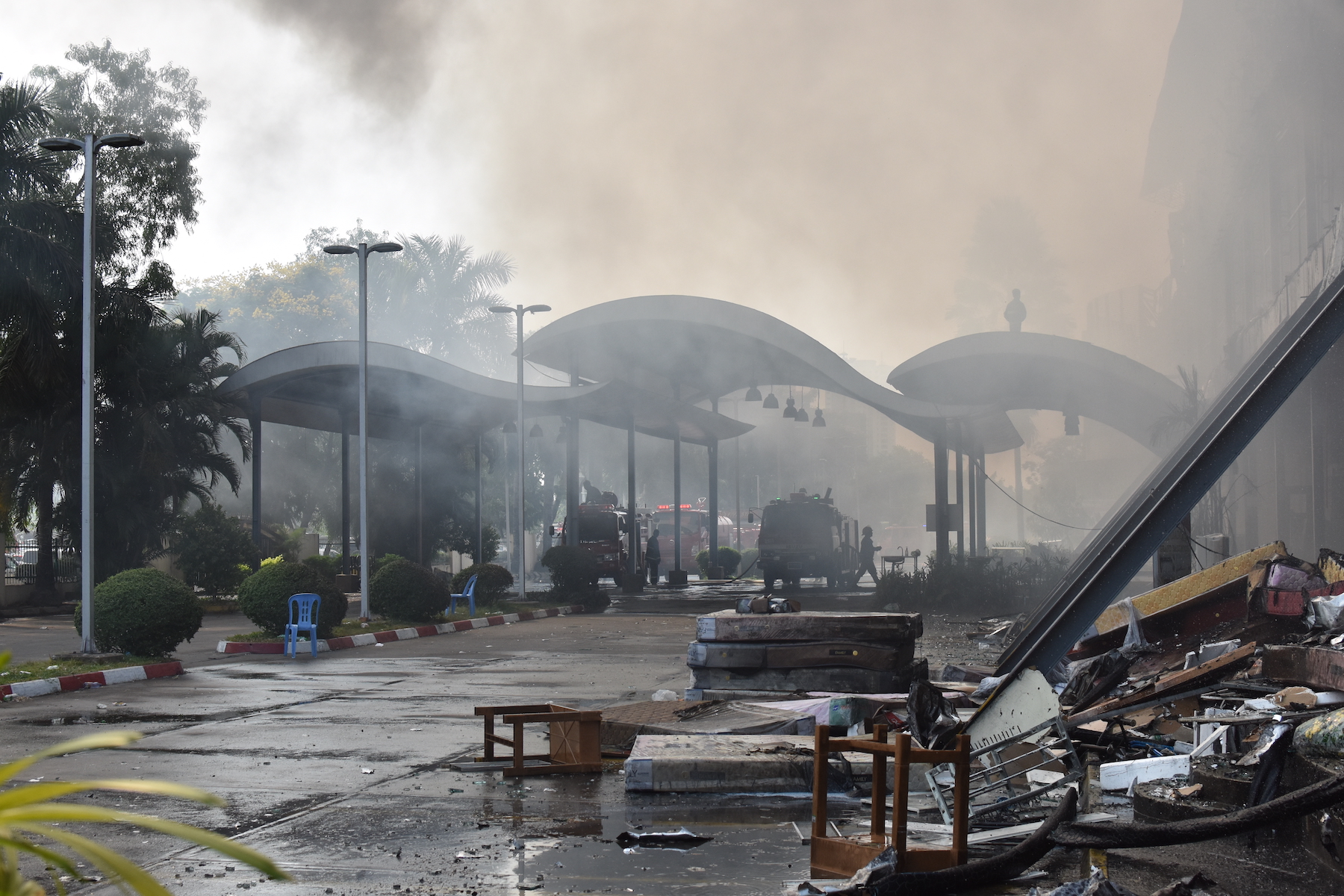
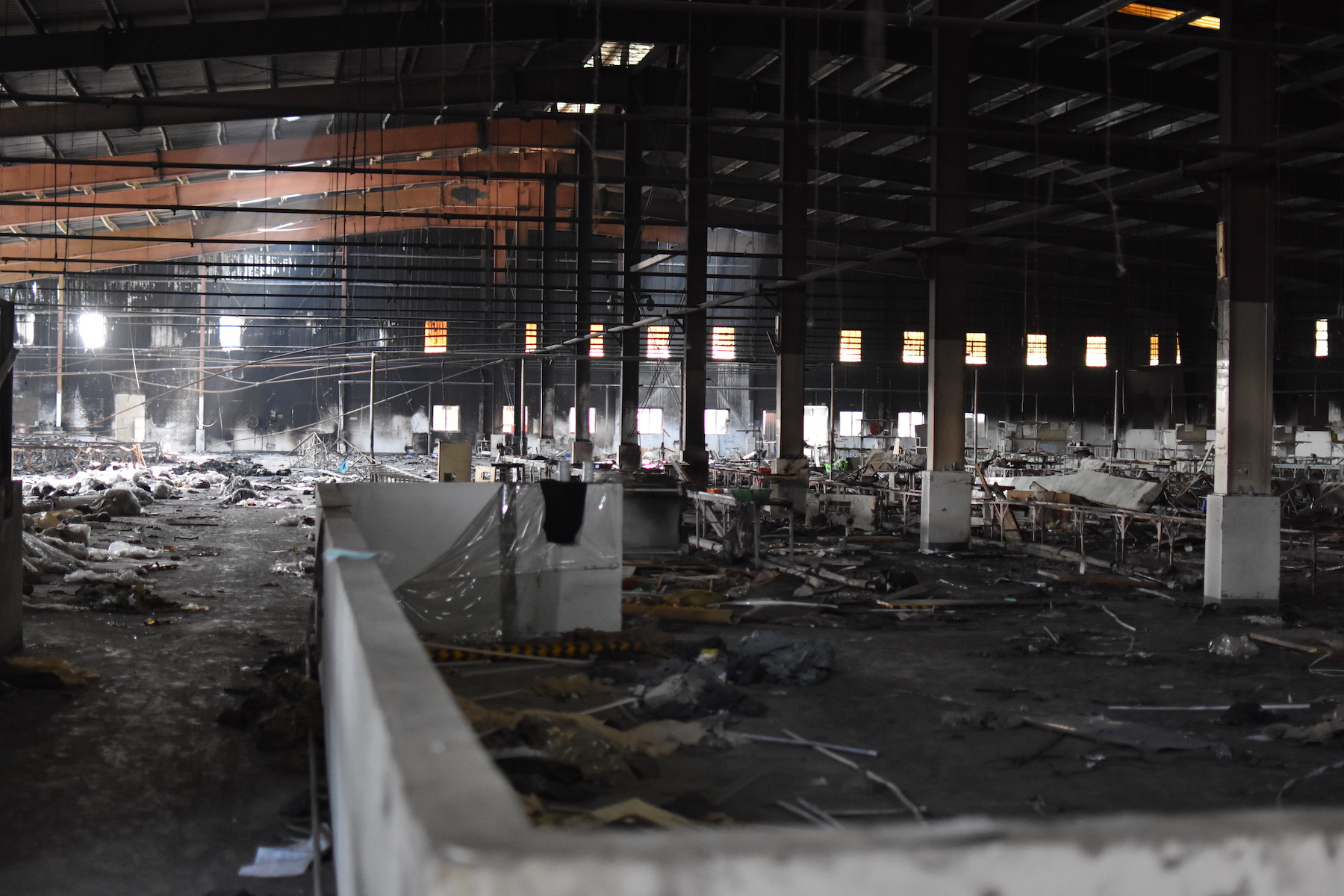
On our last day in Yangon, we were taken to 10-Mile Market in Insein Township and were finally exposed to a scene that more closely resembled the reality on the ground. Given what transpired, I can only imagine it was a miscalculation on the part of the military.
As I began walking through the market, a rumble of noise grew. Within seconds, the previously muted street was filled with the sound of banging pots and pans, an act of anti-military disobedience that had become widespread across Myanmar since the coup. I looked around as the noise mounted and saw that nearly everyone in sight was holding up the three-finger salute, a symbol that has become synonymous with the anti-coup Civil Disobedience Movement in Myanmar. A brave act of defiance given that we were accompanied by military personnel.
A man ran by me, shaking me out of my stunned silence, beckoning for more vendors to join in with the noise-making. He stopped in front of me to explain what he was doing.
“We beat the drums against the military coup, this is our symbol. All Myanmar people don’t like the military coup, they want an elected government – the government of Aung San Suu Kyi,” said the man, a 60-year-old retired seaman, referring to the ousted civilian leader.
As he spoke, a stream of police officers began marching down the streets. The man pulled me back as they passed.
“You see what I mean?” he asked, referencing the growing security presence in front of us, deployed to quiet the protesters. “The police come to this market everyday. Every night at 8pm they come to quiet us. They are everywhere, they oppress all people.”
The military is shooting everyone without reason. If we bang our pots and pans, they shoot us. Please help us, we really need it. They are covering up the truth
Shortly after, as we were leaving the market, one young woman began to cry as she told me about what was unfolding in her country. She knew the risk in speaking with me, but said it was more important for her to share her truth.
“The military is shooting everyone without reason. If we bang our pots and pans, they shoot us. Please help us, we really need it. They are covering up the truth. The military wants to show fake news to the world,” said the woman.
This was a plea I had heard many times before, in speaking with other activists in Myanmar, as well as with friends in-country and across social media. And the military did try and censor those who had spoken out. Soon after we left the market, I read on Twitter that two people who had spoken to CNN that morning had been arrested. The total number of detained would increase to eleven – though only eight had spoken directly to CNN – by the end of our tour.
As these reports came in, CNN was in constant communication with their colleagues to find out as much information as possible on the whereabouts of those who had been detained and apply pressure through all channels to secure their release. They also spoke with Ben-Menashe on several occasions and implored him to take immediate action. Eight of the eleven that CNN knew about were eventually released.
According to Ben-Menashe, even the military was upset by the arrests, as they overshadowed the rest of the tour.
“They shouldn’t have been arrested in the first place,” Ben-Menashe told the Globe on April 8, in a follow up conversation after the trip. “It was a local idiot cop that did it and when the higher-ups learned about it, they were immediately released.”

We also visited Mingaladon Market, known for being a “military market” as it’s frequented by military personnel and their families. We later found out from individuals at the market that several of our handlers had come by earlier to tell shop-owners to open their stands and put on a front while we were visiting. Several had even seemingly been coached to flash the peace sign that we had seen from other carefully-placed individuals throughout the tour. It seemed to be an effort by the military to challenge the three-finger salute.
And yet, even with these propaganda efforts in place, the military failed, yet again, to suppress the protest efforts against them. While at the market, a black car screeched to a halt next to me and three sets of hands extended out of the window holding up the three-finger salute.
“We heard that you were going to be here and we wanted to come to talk to you,” a woman in the car screamed out. Apparently she had seen us on Facebook, likely from an image posted immediately after we had arrived. In Myanmar, even with internet blackouts, news travels quickly over social media.
She said that she knew this market’s clientele was largely military-backed and they wanted to make sure we heard the other side – that of the protesters.
A stream of young people on motorbikes followed, carrying with them bouquets of flowers with sticky notes attached publicising a strike later that day in commemoration of those who had been killed by security forces since February 1.
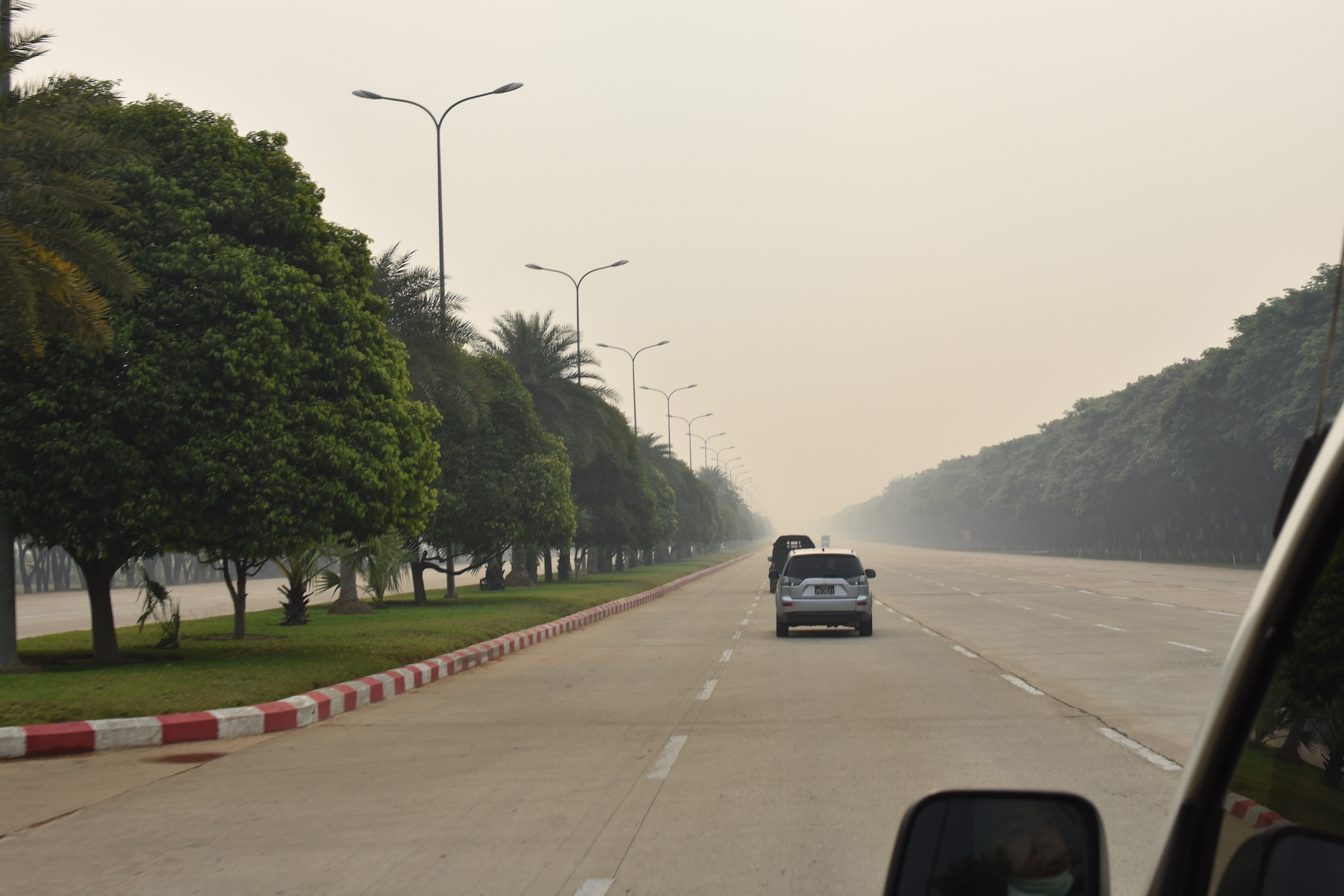
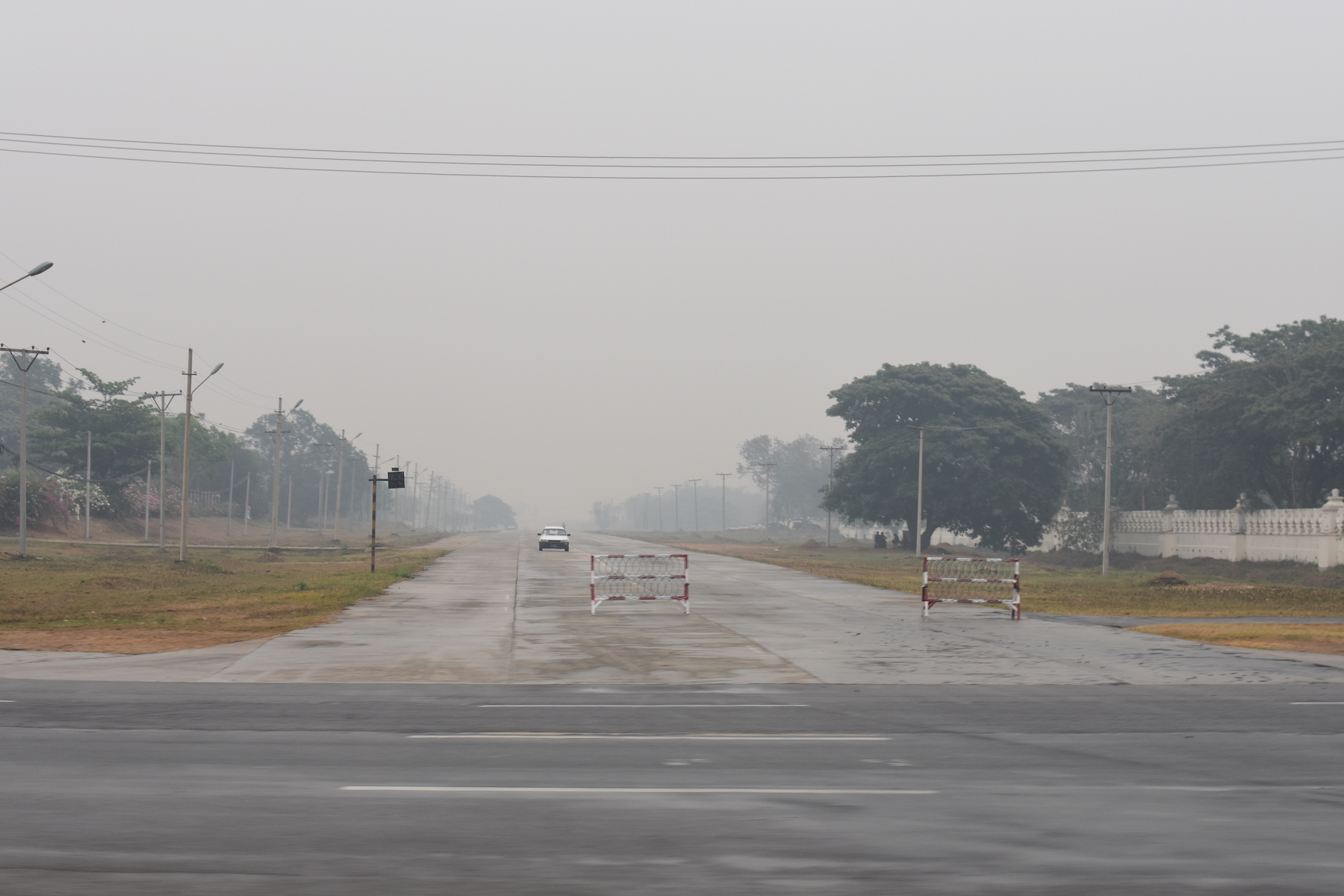
After Yangon, we drove up to Naypyidaw, Myanmar’s ghost town capital that, even pre-coup, had a dystopian air. Fog rolled through the streets as we drove down the infamous empty 12-line highway. It was still dry season in Myanmar, and yet a storm had descended on the country and it was raining heavily – a fitting, albeit ominous, undertone for our trip.
Our time in the capital had been planned around our interview with Major General Zaw Min Tun. We repeatedly asked our liaison and Ben-Menashe to speak with other members of the military, especially those at the highest levels; each request was denied or went unanswered.
Claiming that the military was unconcerned with international condemnation and suggesting that violence would be used to counter efforts by the Committee Representing the Pyidaungsu Hluttaw, a provisional government of toppled representatives, the major general offered further insight into the military’s agenda and their failing claims of legitimacy.
And yet, despite their best efforts, the regime’s ill-fated propaganda schemes did little to flip the narrative. If anything, what remains most poignant from this trip are the brave voices of the people who spoke out against the regime – in person, from balconies, in cars, and online.
One woman cried out to us as we left the market in Yangon.
“Please report back our real stories.”
This is the second story by Allegra Mendelson from her recent PR tour in Myanmar. The first, written in partnership with Al Jazeera, can be read here: Myanmar military hints at longer state of emergency in PR tour interview
